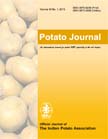A collaborative study was undertaken on eighteen micro-nutrient rich potato genotypes to evaluate their yield performance at Agriculture Research Station (ARS, Horticulture Farm) Rajikot as an on-station and at farmers’ field of Patmara and Talium as on-farm in Jumla District of Nepal during 2013-2014. Mean marketable tuber weight/plot over on-station and on-farm trials in both the years was highest (9.2 kg) in clone CIP 395112.32 and total tuber number/plant was highest in Jumla Local (10.0) and Kufri Jyoti (9.0). The average marketable yield of on-station and on-farm experiments of two years recorded the highest in clone CIP 393073.179 (22.6 t/ha) and Kufri Jyoti (22.1 t/ha). CIP 395112.32 and CIP 394611.112 produced the average highest yield (21.9 and 20.4 t/ha, respectively). Participatory evaluation of organoleptic traits exhibited that tubers of CIP 393073.179, CIP 395112.32 and CIP 394611.112 had acceptable quality for appearance, taste and texture. These potato clones can be recommended to farmers for commercial production to solve the malnutrition and food insecurity problems.
Evaluation of micro-nutrient rich potato genotypes in temperate conditions of Nepal.
Citation: Luitel, B.P.; Lama, L.; Khatri, B.B.; Choudhary, D.; Giri, R.K.; Kadian, M.S.; Arya, S.; Dhakal, R.; Bonierbale, M. 2016. Evaluation of micro-nutrient rich potato genotypes in temperate conditions of Nepal.Journal Article Potato Journal. (India). ISSN 0970-8235. 43(2):138-145.
2017-03-28
GENETICS, GENOMICS AND CROP IMPROVEMENT SCIENCES GGCI, NUTRITION, POTATO AGRI-FOOD SYSTEMS, POTATOES
ASIA, Southern Asia
NEPAL
journal_article

